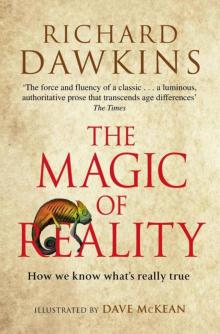- Home
- Richard Dawkins
Outgrowing God Page 9
Outgrowing God Read online
Page 9
Sixth Commandment: Thou shalt not kill.
This is so familiar in the language of the older King James version that I’ve used that here, and for the remaining commandments, rather than the more modern translation. We’d probably agree that this one is a good commandment. Perhaps that’s why it’s the only one that many who claim to revere the Ten Commandments can actually remember. There seems no strong objection to pinning this one up in the court-house because murder, after all, is against the law of every country. In fact, the Sixth Commandment seems almost too obvious. When Moses came down from the mountain with the stone tablets, can you imagine the people reading them and saying, ‘Oh! Thou shalt not kill? Good heavens, we’d never thought of that. Fancy! Thou shalt not kill. Well, well, well. Right, I’ll remember that, no more murdering people from now on.’
But although it seems obvious, the Sixth Commandment is violated in war, on a grand scale, and with the blessing of the clergy. We’ve already seen how, in the biblical accounts, the Israelites violated it in their fight for Lebensraum against the unfortunate peoples who already lived in the Promised Land – and did so on explicit orders from God. In the First World War, British soldiers were ordered to kill German soldiers. And German soldiers were given similar orders to kill their enemies. Both sides thought God was egging them on, which inspired the poet J. C. Squire to write:
God heard the embattled nations sing and shout
‘Gott strafe England’ and ‘God save the King!’
God this, God that, and God the other thing –
‘Good God!’ said God, ‘I’ve got my work cut out!’
Orders to kill, with God’s apparent blessing, have been given to soldiers in wars throughout history.
Think about this. In those American states that execute murderers, the accused is brought to trial: this can last weeks or months, and a prosecuting lawyer has to convince a jury of guilt ‘beyond reasonable doubt’. Numerous appeals can be lodged before the death penalty is actually carried out. Finally, a solemn death warrant has to be signed by the state governor, who usually takes the responsibility very seriously. And then, on the morning of the execution, there is a grisly ritual of a last, favourite breakfast. But when a British soldier kills a German soldier in war, the German soldier has – as far as the British soldier knows – committed no crime. He has not been tried in court. He has not been formally sentenced to death, he cannot call a lawyer and he has no right of appeal. He may not even have volunteered for the army but simply been called up, against his will. And then we’re ordered to shoot him. In the Second World War, bomber crews on both sides were ordered to kill thousands of civilians, again without trial. Thou shalt not kill?
In Britain you could gain exemption from military service by declaring that you were a conscientious objector who refused to kill – but then you had to go before a tribunal to justify your objection to killing, and it was quite difficult to convince them. The easy way to be allowed not to fight was to have parents who belonged to a pacifist religion such as the Quakers. But if you’d thought it out for yourself, perhaps even written a PhD thesis on the immorality of war, you still had to convince the tribunal you should be allowed to stay out of the army. If you succeeded, you could drive an ambulance instead. I probably would have failed to convince them. But I would have secretly shot to miss.
What the Sixth Commandment originally meant was ‘Thou shalt not kill members of thine own tribe.’ (Unless, of course, they gather sticks on the sabbath or commit other unforgivable crimes!) We know that, because the God character ordered his people to kill other tribes with abandon and with relish.
Seventh Commandment: Thou shalt not commit adultery.
That sounds straightforward enough. Don’t have sex with somebody if either of you is married to somebody else. But perhaps you can imagine circumstances where it should be relaxed. Like when somebody in an unhappy and long broken marriage falls deeply in love with somebody else. As we’ll see later, some people think moral rules are absolute and unbreakable under any circumstances. Other people think rules should be relaxed depending on the particular case. Anyway, many people would say that each individual’s love life is a private matter and not a matter for a commandment stuck up in a state court-house as though it were a law of the land.
Eighth Commandment: Thou shalt not steal.
As with ‘Thou shalt not kill’, there seems no objection to putting this up in the court-house. Stealing, like murder, is against the law in all countries anyway.
Ninth Commandment: Thou shalt not bear false witness against thy neighbour.
Yes indeed. Don’t bear false witness against – that is, tell lies about – anybody, neighbour or not. Again, it’s a cornerstone of the law that witnesses, especially when under oath, must ‘tell the truth, the whole truth and nothing but the truth’.
Tenth Commandment: Thou shalt not covet thy neighbour’s house, thou shalt not covet thy neighbour’s wife, nor his manservant, nor his maidservant, nor his ox, nor his ass, nor any thing that is thy neighbour’s.
‘Covet’ is a somewhat outdated word for ‘envy’, with the added element of seeking to possess the envied thing or person. It can be hard not to envy somebody who is much more fortunate than you are. But it’s surely not a matter for the law, so long as you don’t actually go out and grab the thing you covet. Even that, according to some political revolutionaries, might be justified. They think the state is justified in seizing private wealth and using it for everybody. I’m not a communist or an anarchist, but perhaps you can see where they are coming from? Other people, who call themselves libertarians, go to the opposite extreme. They think that even taxation is a form of theft, robbing the rich to pay the poor. The legendary bowman Robin Hood did exactly that, and he has a certain romantic appeal in some quarters. Like his more modern equivalents, the Wild West’s Jesse James and the Irish highwayman Willie Brennan.
By the way, notice that the Tenth Commandment counts the neighbour’s wife, and his servants, among his possessions, like his house or his ox. What do you think of the idea that a woman is the property of some man: one of his possessions, a ‘thing’ that he owns? I think it’s a horrible idea, but it has long been deeply embedded in many cultures and we still see it today in places such as Pakistan and Saudi Arabia, where it is sanctioned by the state religion. Some people (not I) think that’s a good enough reason to ‘respect’ it. You may have heard the phrase ‘It’s part of their culture’, with the implication that we have to respect it. Saudi Arabia, as I write, has only just passed a law allowing women to drive. A married woman is still not allowed to open a bank account without her husband’s permission. She is not allowed out of the house unless accompanied by her husband or by a male relative – who can be a tiny male child. Just picture the scene: a grown woman, university-educated perhaps, has to ask her eight-year-old son for permission to leave the house. And he has to come with her to serve as her male ‘protector’. Those woman-hating laws are inspired by Islam.
I can imagine that, if the Tenth Commandment were pinned up in an American court-house, plenty of women would have something to say about it. At very least we might add, in the interests of equality (and moving with the times), ‘Thou shalt not covet thy neighbour’s husband. Nor her Jaguar. Nor her doctoral degree.’
Well, of course, the Ten Commandments are out of date. It’s unfair to blame the Bible for being written thousands of years ago when men owned their wives, and their most prized possessions were their slaves. Of course we’ve moved on since those bad old days. But isn’t that the whole point? Yes, we have moved on. And that’s precisely why we shouldn’t be getting our morals, our ‘right and wrong’, our ‘do and don’t’ from the Bible. And as a matter of fact we don’t get them from the Bible. If we did, we’d still be stoning people to death for working on the sabbath. Or for worshipping the wrong gods.
‘But’, some may say, ‘that’s just
the Old Testament. Let’s get our morals from the New Testament instead.’ Well, yes, that might be a better idea. Jesus said some pretty nice things, in the Sermon on the Mount, for instance. Certainly very different from anything in the Old Testament. But how do we know which statements in the Bible are good, which bad? How do we decide? That decision has to be based on something outside the Bible: otherwise it’s circular reasoning, unless you invent a rule like ‘later verses supersede earlier ones’. By the way, Islam does have exactly that rule, but unfortunately it ends up going the wrong way. The Prophet Mohammed said some quite nice things during his earlier time in Mecca. But later, after he moved to Medina, he became, for reasons to do with the historical circumstances, much more warlike. Many of the awful things done in the name of Islam can be justified using later ‘Medina verses’ in the Quran, which contradict – and supersede, according to the official doctrine – earlier, nicer, ‘Mecca verses’.
Back to the Christian Bible. There’s nothing in it that says, ‘Forget about the Old Testament, just read the New Testament to find out what’s right or wrong.’ Jesus could have said that. In fact (Matthew 5: 17), he said exactly the opposite:
Do not think that I have come to abolish the Law or the Prophets; I have not come to abolish them but to fulfil them. I tell you the truth, until heaven and earth disappear, not the smallest letter, not the least stroke of a pen, will by any means disappear from the Law until everything is accomplished.
Also in Luke (16: 17):
It is easier for heaven and earth to disappear than for the least stroke of a pen to drop out of the Law.
‘The Law’, to a Jew like Jesus, meant certain books of the Old Testament. Jesus seems to have taken a rather rosy view of the Old Testament. In Matthew 7: 12 he states the rather nice principle which we know as the Golden Rule (treat other people the way you’d like them to treat you) and goes on to say it is the central message of the Old Testament:
So in everything, do to others what you would have them do to you, for this sums up the Law and the Prophets.
It’s true you can find something that sounds a little bit like the Golden Rule in the Old Testament (and you can find older, more precise versions of the Golden Rule in texts from ancient Egypt, India, China and Greece):
Do not seek revenge or bear a grudge against one of your people, but love your neighbour as yourself. I am the Lord. (Leviticus 19: 18)
But it’s a great exaggeration to say it’s the main message of the Old Testament. As we saw in Chapter 4, God was himself pretty expert at bearing grudges. And there’s any number of verses of the Old Testament which preach vengeance.
If anyone injures his neighbour, whatever he has done must be done to him: fracture for fracture, eye for eye, tooth for tooth. As he has injured the other, so he is to be injured. (Leviticus 24: 19)
By the way, that’s another thing that comes straight from Babylon, in this case the ‘Code of Hammurabi’. Hammurabi was a renowned Babylonian king, and his rulebook was written down about a thousand years before the Old Testament.
Here’s another version from the Bible, the Book of Deuteronomy:
Show no pity: life for life, eye for eye, tooth for tooth, hand for hand, foot for foot. (Deuteronomy 19: 21)
I suppose you could say it’s a kind of negative version of the Golden Rule. But it doesn’t sound so nice the negative way round, does it? Jesus himself (Matthew 5: 38) went out of his way to say the opposite, even quoting that very verse from the Old Testament:
You have heard that it was said, ‘Eye for eye, and tooth for tooth.’ But I tell you, Do not resist an evil person. If someone strikes you on the right cheek, turn to him the other also. And if someone wants to sue you and take your tunic, let him have your cloak as well. If someone forces you to go one mile, go with him two miles.
I don’t think there’s ever been a clearer or more generous repudiation of the idea of vengeance. It puts Jesus far ahead of his time. And far ahead of the Old Testament God.
Yet Jesus himself was not above vengeance. Even discounting the stories in the infant gospel of Thomas, the canonical gospels of both Matthew and Mark tell how he took petty revenge on, of all things, a fig tree:
Early in the morning, as he was on his way back to the city, he was hungry. Seeing a fig tree by the road, he went up to it but found nothing on it except leaves. Then he said to it, ‘May you never bear fruit again!’ Immediately the tree withered. (Matthew 21: 18)
Mark’s version (11: 13) adds that the reason there were no figs on the tree was that it was too early in the year. Poor fig tree; it was simply not yet the fruiting season.
Christians are understandably embarrassed by the story of the fig tree. Some say it never happened, like the stories in the infant gospel of Thomas. Others just ignore it and concentrate on the nice bits of the New Testament. Yet others say it was ‘symbolic’. There never was an actual fig tree. It was some kind of metaphor for the nation of Israel. That’s a favourite dodge of theologians, had you noticed? If you don’t like something in the Bible, say it’s only symbolic, it never really happened, it’s a metaphor to convey a message. And of course they get to choose which verses are metaphors and which are to be taken literally.
There are other places in the official gospels where Jesus comes across with some of the nastiness of his Old Testament ‘father’. In Luke 19: 27 he says of people who don’t want him to reign over them as their king, bring them ‘hither and slay them before me’. Rather surprisingly in view of Roman Catholic worship of his mother Mary, Jesus himself was not very nice to her. On the occasion of his first miracle, turning water into wine at a wedding feast, when his mother approached him, Jesus said, ‘Woman, what have I to do with thee?’ Perhaps it sounded less cruel in the original Aramaic than when translated into the English of the King James version. One of the modern translations, the New International version, sticks ‘Dear’ in front of ‘woman’, which at least changes the tone for the better. (A classical scholar friend tells me the Greek word used here for ‘woman’ can sometimes have a sort of ‘dear’ meaning.) And, to be fair, since the whole story of turning water into wine certainly isn’t true, there’s a good chance Jesus’s apparent put-down of Mary at the wedding didn’t really happen either.
Whether it happened or not, this is not the only story where Jesus comes across as a surprise choice of role model for family values:
‘If anyone comes to me and does not hate his father and mother, his wife and children, his brothers and sisters – yes, even his own life – he cannot be my disciple.’ (Luke 14: 26)
On another occasion, Jesus was speaking to a crowd of people and was told that his mother and his brothers were waiting, hoping to have a word with him. Again, a put-down:
Someone told him, ‘Your mother and brothers are standing outside, wanting to speak to you.’ He replied to him, ‘Who is my mother, and who are my brothers?’ And he waved his hand towards his disciples and said, ‘Here are my mother and my brothers.’ (Matthew 12: 48)
At other times, Jesus comes across as not so much bad as ignorant, and in a not very nice way. In the Gadarene region, Jesus came upon a pair of men ‘possessed’ by ‘demons’ (Matthew 8). ‘They were so violent that no one could pass that way.’ Probably schizophrenia, then, or some other mental illness, but Jesus followed the false belief of his time, the belief in ‘demons’. He commanded the demons to come out of the men. But now the demons had nowhere to go, so he told them, instead, to enter a herd of pigs that were feeding nearby. The demons did, and the poor pigs (now known proverbially as the Gadarene Swine) stampeded headlong over a steep cliff and drowned. Not a nice story. Of course I wouldn’t normally blame a man of the first century for ignorance of mental illness. Judging people of an earlier time by the standards of your own time is one of the things good historians just don’t do. But Jesus was supposed to be no ordinary man. He was supposed to be God. Shouldn�
�t God have known better?
Jesus was not a bad man, simply a man of his time. Imagine how impressive it would be if Jesus had said, ‘Verily I say unto you, there are no demons, nothing that could fly out of a man and into pigs. This man has an affliction in his head. There are no demons anywhere.’ Even better, imagine how impressed we’d be if Jesus had told his disciples that the Earth orbits the sun, that all living creatures are cousins, that the Earth is billions of years old, that the map of the world changes over millions of years…But no, his wisdom, impressive though it was in many ways, was the wisdom of a good man of his time, not a god. Just a man, though a good one.
And imagine how impressed we’d be if the Prophet Mohammed, channelling God, had said, ‘O Believers, the Sun is a star like any of the other stars in the sky. Just much nearer than them. It seems to rise in the east and travel across the sky till it sets in the west. But truly it is just the Earth spinning which makes it look that way.’ Alas, no, what he actually said was, ‘The Sun sets in a marsh.’
Or suppose Elijah, or Isaiah, had said, ‘Hear, O Israel, the word of the Lord your God. The Lord has revealed to me in a dream that nothing can travel faster than light.’ Instead, all we get from them is orders to worship only one God, plus lots of other rules for how to live – all things that might occur to men of their own time.
You can find some nice verses in the Bible, some even in the Old Testament – though not many, in my experience. But how do we decide which verses to ignore because they are nasty, which verses to promote because they are nice? The answer has to be that we have some other criterion for deciding, some method of judging what’s nice and what’s nasty. A reason that doesn’t come from the Bible itself. But then, whatever that criterion turns out to be, why don’t we just use it directly? If we have some independent criterion for deciding which biblical verses are good and which bad, why bother with the Bible at all?

 The Magic of Reality
The Magic of Reality The Extended Phenotype
The Extended Phenotype The God Delusion
The God Delusion The Selfish Gene
The Selfish Gene The Blind Watchmaker
The Blind Watchmaker The Greatest Show on Earth
The Greatest Show on Earth Climbing Mount Improbable
Climbing Mount Improbable Outgrowing God
Outgrowing God Brief Candle in the Dark
Brief Candle in the Dark The Greatest Show on Earth: The Evidence for Evolution
The Greatest Show on Earth: The Evidence for Evolution Science in the Soul
Science in the Soul An Appetite for Wonder
An Appetite for Wonder